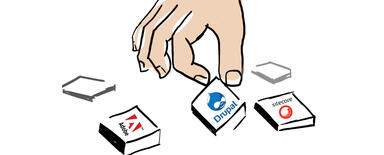
Common mistakes made by Drupal beginners
Drupal is an open-source platform that more than a million of people across the globe find useful for their content management purposes. They choose Drupal because of its flexibility, reliability, and security. However, not all of them know how to use it properly. Find out about the mistakes that Drupal beginners often make.
Let’s dive deeper and analyze the examples of developer’s activity that could make Drupal ineffective and see what to do to get better results right away!
Bad content structure
Without the proper plan in place, your content structure can end up with a messy, incoherent experience for the site visitors. Determining a good structure from the very start increase your website performance.
Try to minimize the number of content types, fields and tables. Too many content types can confuse content creators so you need to standardize them. For instance, you don’t need both “news” and “article” types, as these are almost the same - leave one of them. Moreover, creating new fields for every content type is a waste of resources that also comes with worse performance. Avoid making similar fields, as it brings unnecessary complexity to your site.
This is why it’s good to design the system before you start to implement the elements. Take time to think about the structure and decide how the Drupal architecture should look like to improve website’s performance. Make it as simple as possible and use only the unnecessary elements.
New Drupal developers also have problems with the folder structure. To be more precise, it’s about setting up wrong folder structure and putting themes and modules in the folder on a root level rather than in separate folders. This is one of the serious mistakes, as it affects the process of upgrading to the latest version and make debugging a way more difficult. You will lose a lot of time trying to fix it, so focus on creating a proper folder structure in the beginning.
Using unnecessary Drupal modules across the site
Inexperienced developers can be amazed by a plethora of modules available which leads to installing too many of them. Even if Drupal developers don’t make a use of all of the modules at the beginning, they think that they will need it later. If you’re one of these developers… stop doing this!
You need to realize that the more elements you have, the slower is your website, not to mention the mess you have in the code. With that being said, review all the modules you have again and get rid of ones you don’t need. Also, too many modules can decrease website security, so think about that.
Not removing previous versions of the modules
Speaking of modules, Drupal developers often forget to remove older versions of downloaded modules. Some of them simply don’t know that even if the module is placed into a different directory, Drupal may decide to use the older version. It’s because the folders are usually on the same level.
Sometimes, the software can switch between various module versions so, as you can guess, it can cause some problems. And we all know you don’t need such unwanted surprises.
Choosing unsupported modules in Drupal
A large number of different modules can be a challenge for a Drupal beginner, especially when there are ones that cover all the functionalities you look for. Unsupported modules can cause some problems in the long run, for instance, because of the compatibility issues or bugs that will never be fixed.
Before downloading a new module, check when the last update was made and read the description provided by the author. Note that some projects are marked unsupported for security reasons so think twice before you decide to use one of these, as you risk data breach.
Ignoring code standards
When several people are working on the same website, it’s important to have code standards in place. Without them, you risk wasting the time trying to understand other developer’s code. Don’t make the mistake and start by creating the guideline to improve the quality of the source code and the efficiency of the team.
Applying Drupal code standards is a good practice, even if you are a single developer working on your own project. Think about the situation when you want to expand the project that requires another developer’s involvement. With documented standards, it will be much easier to start, so… draw conclusions.
Never make Drupal beginners mistakes again
It’s not surprising that newbies make mistakes, they simply need time to learn about all the opportunities the system gives them. Drupal is a complex tool, so there’s a huge chance to create something that doesn’t work the way we wanted, especially when we don’t have proper knowledge and experience.
The good news is that you can always ask questions - the Drupal community exceeded a million of users that are willing to help. Someday, you can also be handy by sharing your experience.










